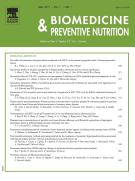Nuclear Factor-κB is expressed in early colon cancer and its down-regulation by Curcumin and Diclofenac is associated with the suppression of proliferation and the induction of apoptosis - 09/11/12

Abstract |
A number of experimental, epidemiological, and clinical studies suggest that non-steroidal anti-inflammatory drugs (NSAIDs), particularly the highly selective cyclooxygenase (COX)-2 inhibitors may prevent colon cancer. However, the long-term use of COX-2 inhibitors is not completely toxicity-free and therefore necessitated to be applied along with amenable natural anticancer agent. The present study demonstrates the more potential chemopreventive and anti-inflammatory effects of Diclofenac, a preferential COX-2 inhibitor and Curcumin, a natural anti-inflammatory agent when given in combination in 1,2-dimethylhydrazine (DMH) induced early neoplasm of colon. Both Diclofenac and Curcumin lowered the COX-2 activity and PGE2 level while the expression of IκB⍺ was found higher and a lowered IKK activity stating that these agents may suppress the transfer of NF-κB to the nucleus and its pro-inflammatory gene transcription. Diclofenac and Curcumin were able to down-regulate the level of pro-inflammatory cytokines, TNF-⍺, IL-1β and IL-2 through the inhibition of NF-κB. Flow cytometric data showed that Diclofenac and Curcumin were able to induce apoptosis, thus confirming the regulatory role of NF-κB which is associated with the inhibition of proliferation and induction of apoptosis. Both Diclofenac and Curcumin have chemopreventive effects alone on the early neoplasm while the effect is found enhanced using a combination regimen of the two drugs.
Le texte complet de cet article est disponible en PDF.Keywords : Colon cancer, Cyclooxygenase-2, Cytokines, Non-steroidal anti-inflammatory drugs
Plan
Vol 2 - N° 4
P. 228-238 - octobre 2012 Retour au numéroBienvenue sur EM-consulte, la référence des professionnels de santé.
L’accès au texte intégral de cet article nécessite un abonnement.
Déjà abonné à cette revue ?

